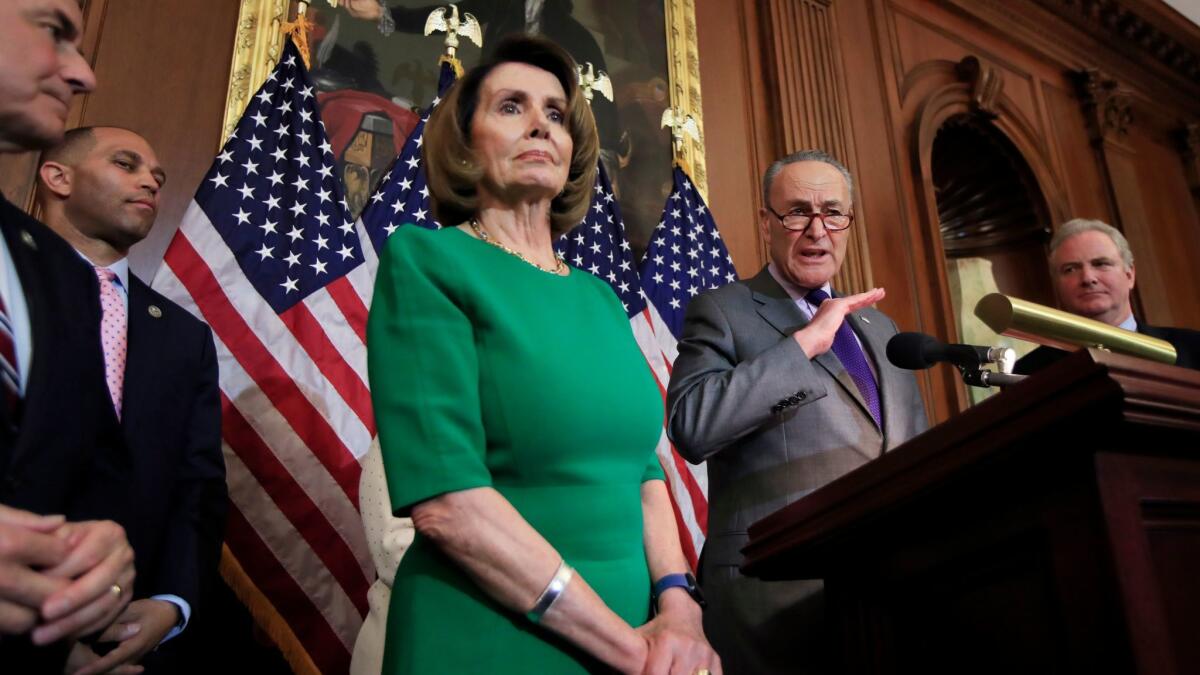Op-Ed: Democrats need to put forward a tax plan too

Goaded by President Trump, Republican leaders outlined a tax-reform plan this week that is marginally less generous to the wealthy than many conservatives would like. As the GOP struggles to cobble together an actual bill that can unite their fractious party, it’s tempting for Democrats to sit back and enjoy the show. When your opponents are fighting each other, why interfere? In fact, Democratic leaders in Congress are reportedly discouraging their colleagues from outlining their ideas for reform.
But that’s shortsighted. How can Democrats steer Congress toward constructive reform without a proposal of their own? And how can the Democratic Party rebuild its own credibility on economic issues if it has no vision on tax policy?
For Americans, and for the viability of their own party, Democrats need to offer a progressive road map for tax reform that clearly spells out what they would change in our existing tax laws, and why. The party is going to need a coherent and principled basis for judging and improving the package that Republicans come up with, which, based on the vague outline released this week, will explode the debt while delivering the biggest tax cuts to the nation’s wealthiest families.
At the moment, Democratic tax policy can be summed up this way: Raise taxes on the rich. That’s not good enough. Though the approach may excite hardcore partisans and class warriors, it doesn’t speak to working- and middle-class aspirations for better jobs and higher wages. Americans want a forward-looking and concrete plan for pulling the country out of its slow-growth rut and ensuring that workers without a college degree can find middle-income jobs in today’s knowledge economy.
The American tax system is not just outdated. It’s positively Byzantine.
Rather than sit mute as Republicans flail, Democrats ought to view the coming debate over tax reform as an opportunity to show Americans what they stand for, and offer, if not a detailed tax bill, these basic progressive tenets:
America needs a tax code that promotes economic growth and innovation.
The U.S. economy, now in its eighth year of a modest expansion, has been mired in slow growth since 2000, averaging just 2% a year. A well-designed tax overhaul could breathe new life into the economy by eliminating market distortions and inefficiencies that misallocate capital. Democrats should push for ending, or at least limiting, a host of tax-preference items that channel investment into tax-favored activities rather than productive ones. They also should call for cutting taxes on start-ups, the most fertile source of new jobs. In the long term, Democrats should advocate for a fundamentally different way of financing government — one that taxes consumption more, and income and innovation far less.
America needs a progressive tax code.
Trump claims falsely that the U.S. is “the highest taxed nation in the world.” In fact, top earners pay less in taxes here than those in most developed countries. Democrats are right when they say that America’s wealthiest families can and should contribute more. But taxing the rich won’t pay for everything. Democrats need to tap new revenue sources. For instance, they should scale back costly tax preferences for health insurance and housing that disproportionately benefit high-income households. They also should lower the payroll tax, which hits working Americans harder than the income tax. Reducing the payroll tax would create an immediate bump in overall economic growth.
America needs a modern business tax code.
Democrats should propose bringing business tax rates down to competitive levels and taxing business activity where it occurs. Not only does our outdated corporate tax system burden many U.S. companies with higher nominal and effective rates than their foreign competitors, it also gives our companies a perverse incentive to park profits overseas. Perhaps out of fear that they will be accused of protecting corporations, some Democrats balk at the prospect of modernizing the business tax system. But if American companies can’t compete internationally because of obsolete tax laws, the American workers they employ will be held back.
America needs a simpler tax code.
The American tax system is not just outdated. It’s positively Byzantine. Streamlining the code would make it much easier for working families to file their taxes. What’s more, many of the most complicated tax preferences serve to benefit corporations and the country’s richest households. Removing or reforming these items and creating a simpler, more transparent tax code would boost public confidence in our system of voluntary compliance.
America needs a fiscally responsible tax code.
Republican leaders in Congress are backpedaling from campaign promises to pass “revenue-neutral” tax reform and reverting to the long-discredited claim that tax cuts will pay for themselves by turbo-charging the economy. As American fiscal policy suffocates under the weight of $20 trillion in national debt, Democrats can’t let Republicans get away with such nonsense. The drain in revenue would put intolerable pressure on public investment and lead to the freezing of much-needed government programs.
To help millions more Americans reach the middle class, and to define themselves as the real party of jobs and growth, Democrats need to put forward a tax plan of their own.
Paul Bledsoe is a strategic advisor at the Progressive Policy Institute and a former staff member of the U.S. Senate Finance Committee. Will Marshall is president of the Progressive Policy Institute.
Follow the Opinion section on Twitter @latimesopinion or Facebook
More to Read
A cure for the common opinion
Get thought-provoking perspectives with our weekly newsletter.
You may occasionally receive promotional content from the Los Angeles Times.










